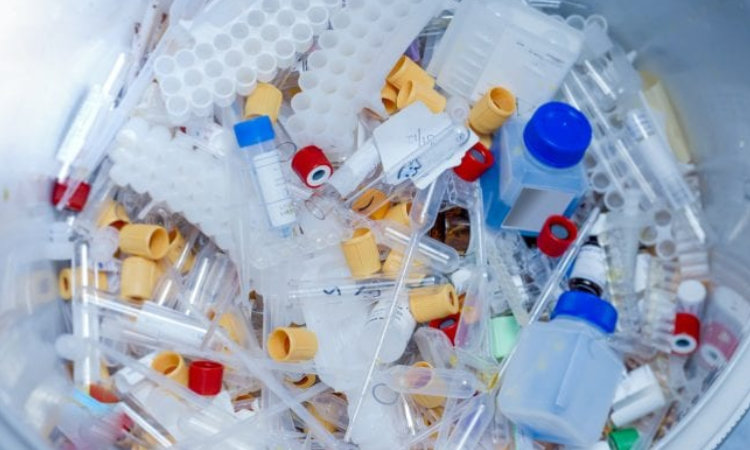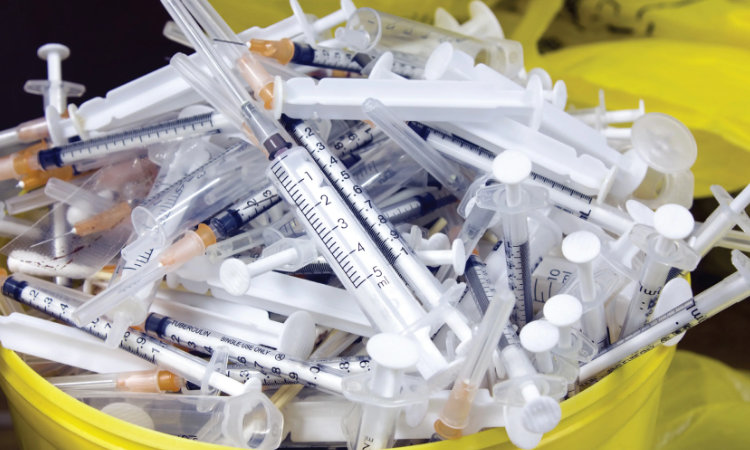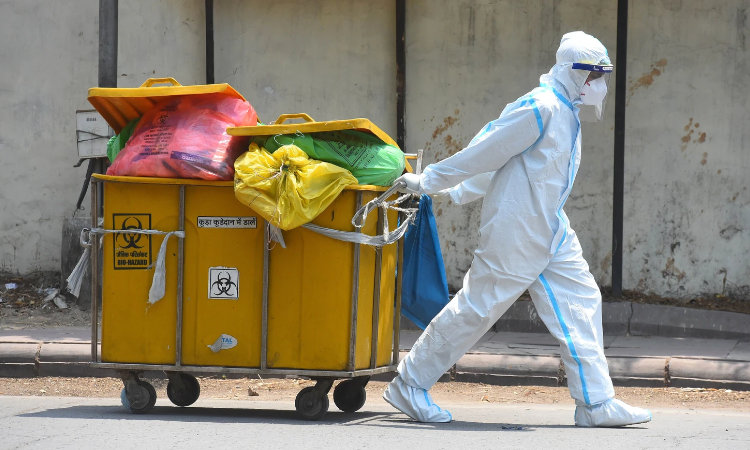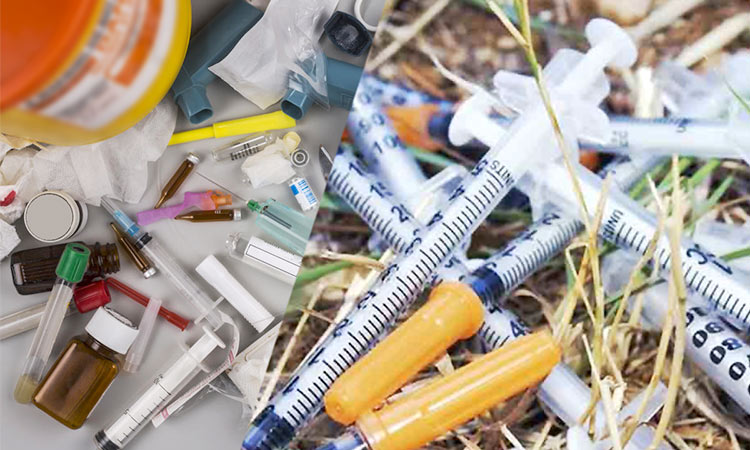



Bio-Medical Waste is a major public health and environment concern. Bio-Medical waste is generated in the process of diagnosis, treatment and prevention of diseases. Pathogens and hazardous chemicals/materials released through health care activities generally reside in the wastes generated in the process. These pathogens and hazardous materials, if not properly treated and disposed, may cause serious damage to human health and environment turning health care institutions from centres of disease prevention and cure to sites of disease proliferation.
Bio-Medical waste is only 20% of the total waste generated in hospitals. These must be separated from municipal waste at the point of generation. Utmost care should be taken regarding sharps – needles etc. Bio-medical waste should be suitably treated through steam sterilization and / or chemical disinfection. Efforts should be made to recycle treated waste as much as possible and incineration should be avoided except in case of anatomical waste produced in bulk in large cities.
The Ministry of Environment and Forests (MoEF), Government of India, has notified The Bio-Medical Waste Management and Handling Rules, 1998 and The Bio-Medical Waste (Management and Handling) (Amendment) Rules,2003 to provide for statutory and obligatory guidelines for health care waste management.Central Pollution Control Board has also issued guidelines on Central Bio-medical Waste Treatment Facilities (CBWTF) and Design and Construction of Incinerator. However, the implementation of these Rules and guidelines as well as the condition of medical waste management in general, remains grossly unsatisfactory.
DISHA campaigns for safe management of bio-medical waste in an eco-friendly and sustainable method. The key to proper management of health care waste lies in their proper segregation, treatment and disposal. DISHA advocates a system for bio-medical waste management that has the following basic features:
- Reduction of the amount of waste
- Reuse of materials with proper safety
- Resource recovery through composting and recycling
- Economic and
- Effective
Policy Level Intervention
DISHA launched a campaign in 1996-97 to revise the proposal, contained in the World Bank project, to install incinerators at every hospital and medical centre in West Bengal having more than 300 beds. The campaign was supported by the network of international organizations, Health Care Without Harm (HCWH). The proposal was eventually dropped.
A large private Central Biomedical Waste Treatment Facility was set up in 2003 in Belgatchia, Howrah to deal with BMW generated in hospitals in Kolkata and Howrah. DISHA raised objection against incineration of soiled biomedical waste (Category 6) in the CBWTF citing CPCB guidelines which allows incineration of only anatomical (Cat 1) and animal waste (Cat 2) and in some cases discarded drugs. However the campaign could not win as the Central Rules, which allow incineration of Cat 6, remain unchanged even after issuance of CPCB guidelines.
Policy Level Intervention
DISHA conducted a base line survey on the status of disposal of medical waste at four important private hospitals viz., Woodlands Hospital, B. M. Birla Heart Research Centre, Kothari Medical Centre & Research Institute and Calcutta Medical Research Institute of Kolkata in 1997. Recommendations were made for safe-management of the hospital waste.
DISHA was involved with setting up of safe waste management project in a specialized rural hospital having no municipal facilities.
DISHA was entrusted with the task of Waste Audit of 20 secondary level government hospitals in West Bengal under the West Bengal State Health System Development Project. The study, completed in 2003, not only contributed to the designing of more appropriate waste management systems in the health care institutions but also indicated the possibilities of resource recovery by assessing the amounts of compostables and recyclables in health care waste.
DISHA was entrusted with the task of Monitoring Health Care Waste Management in 100 government hospitals spread over 14 districts in West Bengal. This assignment under the West Bengal State Health System Development Project considerably furthered implementation of health care waste management in the designated hospitals. It also helped in generating valuable observational data that brought out the problems and prospects of implementing the system. Recommendations were made on the basis of the observations. See Report on implementation of Government action plan on HCWM in 100 hospitals.
DISHA has also been entrusted with the task of providing Sanitation Management Training for Group-D and Safai Karmacharis in 13 secondary level government hospitals of 4 districts of West Bengal.Experience of the training programme may please be seen in Report on Training Programme on Hospital Sanitation.
Most of the efforts made for bio-medical waste management target the urban areas. But in India, there is a vast network of small government health care units in rural set up including Block Primary or Community Health Centres (BPHC or CHC), Primary Health Centres (PHC), Sub-Centres (SC), Outreach Sessions (ORS) and occasional immunisation camps. Though such an individual unit produces a small amount of medical waste, as a whole they produce a huge quantity due to their large number. All these medical waste remain unattended. DISHA conducted a research and produced a Literature Review for Models and Practices on Bio-Medical Waste Management with focus on Primary Health Care.On the basis of the research findings and spot survey of a large number of rural health care units in West Bengal DISHA developed a Strategy Action Plan for Management of Health Care Waste for the Health and Family Welfare Department, Govt. of West Bengal. Report may please be seen in the Bio-medical Waste Management for Basic Health Care System in Rural Areas.The strategy is relevant for bio-medical waste management for other developing countries. In consequence of preparation of the strategy an implementation plan for a district was prepared. Please see Bio-Medical Waste Management for Rural Health Care System – Implementation Plan for District Bankura. All these projects related to medical waste management for rural health care sector were supported by the German Technical Assistance (GTZ) for Health Sector Support .
In 2008 West Bengal Pollution Control Board entrusted DISHA to conduct a study to assess the quantity of bio-medical waste generated and the status of management in the state. The report Bio Medical Waste – Inventory and Status of Management in West Bengal has been submitted to the Central Pollution Control Board.
Ministry of Environment and Forest, Govt. of India issued notification on 24th August, 2011 with draft of a new Bio-medical Waste (Management and Handling) Rules 2011 inviting comments from public within 60 days of notification. DISHA is very much concerned as the proposed Rules will encourage and increase incineration causing severe pollution. DISHA submitted its comments for necessary amendments.
DISHA, since 1996, has been organising public campaign and undertaking watchdog function for safe management of medical waste.
DISHA is a member of the international network HCWH (Health Care Without Harm) and a founder member of HuMAN (Health and Us Medical Waste Action Network) – a national initiative on safe management of bio-medical waste.
DISHA offers its services to help health care institutions, health and municipal authorities towards safe and eco-friendly management of bio-medical waste.
